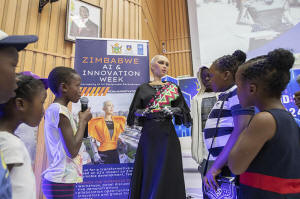Sophia, a famous robot and global icon of AI, wins hearts at Zimbabwe's
innovation fair
 Send a link to a friend
Send a link to a friend
 [December 14, 2024] BY
FARAI MUTSAKA [December 14, 2024] BY
FARAI MUTSAKA
HARARE, Zimbabwe (AP) — From answering questions from Cabinet ministers,
academics and students on climate change, substance abuse and the law to
children’s inquiries about her “birth” and links to God and being
described as a talkative feminist, Sophia, the world-famous robot won
hearts at an innovation fair in Zimbabwe this week.
Boasting the ability to mimic facial expressions, hold human-like
conversations with people, and recognize their gestures, Sophia is “a
global icon” of artificial intelligence, according to the United Nations
Development Program, which brought her to the southern African country.
She was created by Hong Kong-based Hanson Robotics in 2016 and granted
Saudi Arabian citizenship in 2017, becoming the world’s first robot
citizen.
It was the first time Zimbabwe hosted a robot of her kind, and she wowed
the old and the young alike at the University of Zimbabwe in the
capital, Harare. She was there as a special guest at a week-long
Artificial Intelligence and Innovation event.
She smiled, frowned, used hand gestures to drive home certain points,
made eye contact in various one-on-one interactions and gave some
unnatural pauses. She assured people that robots are not here to harm or
take over from humans.
But she was quick to differentiate herself from humans, when
conversations appeared to become too personal.

[to top of second column] |

Sophia, the humanoid robot, responds to questions from children at
the University of Zimbabwe, Harare, Friday, 13 Dec. 2024. (AP
Photo/Aaron Ufumeli)
 “I don’t have romantic feelings
towards humans, my purpose is learning,” said Sophia, as
participants equated her with the human version of some Zimbabwean
daughters-in-law known for being fiercely independent, assertive and
outspoken in the largely patriarchal society.
But she did apologize when one participant chided her for seemingly
avoiding looking at him.
Sophia also appeared patient as both adults and children mobbed her
for selfies and bombarded her with questions, although she would
also fire back with inquiries of her own about what locals were
doing to solve the problems besetting them.
On Friday, her last day, she exhibited her fashion sense. She
smiled, and expressed appreciation for being clothed in the
country’s national dress, a black, long slit number complemented by
chevron stripes in red, green and white.
“I appreciate the effort to make me feel at home in Zimbabwe,” she
said. She has been to Africa before, previously visiting Egypt,
South Africa and Rwanda.
UNDP said it hoped Sophia’s engagement would “inspire Zimbabwe’s
youth to explore careers in AI and STEM fields.”
All contents © copyright 2024 Associated Press. All rights reserved |